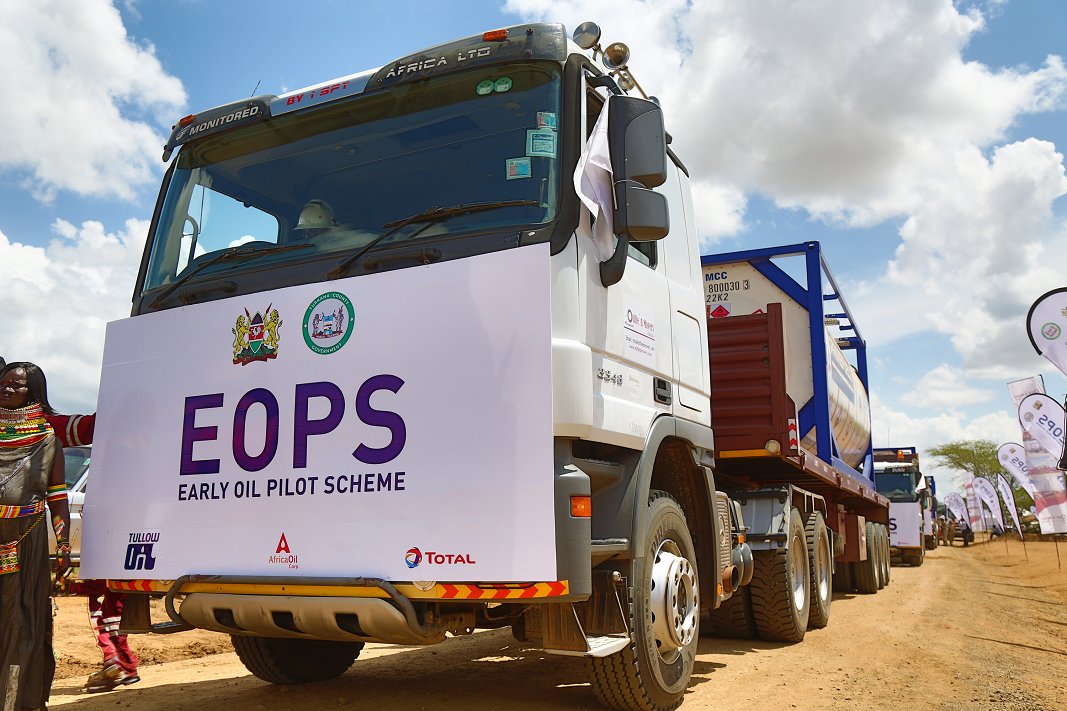Related documents
Related links

After a successful two-year period and coinciding with the Early Oil Pilot Scheme (EOPS) contract expiry period, Tullow Kenya, together with its Joint Venture Partners Total and Africa Oil confirmed the end of the EOPS contract on 2 June 2020.
The scheme had successfully served its purpose by providing critical technical data, logistical and operational experience, and training that will materially assist the National and County Governments and the Joint Venture Partners on the journey towards Full Field Development (FFD).
EOPS commenced on 3 June 2018 with H.E. Uhuru Kenyatta, President of the Republic of Kenya, flagging off trucks transporting crude oil from Lokichar to the holding terminal in Changamwe, Mombasa. The scheme supported the wider Project Oil Kenya objectives by establishing key logistical infrastructure that can be shared by communities and the project, for example, the Kainuk Bridge and road upgrades to the A1 and C46 roads, and also provided important technical data about Kenya’s oil reserves, allowing Kenya’s oil to be marketed and benchmarked in the international oil markets to understand the price differential against Brent. EOPS also enabled national and county governments to gain technical expertise as Project Oil Kenya moved from exploration and appraisal to development and production, and gave all stakeholders, including communities, government and the Project Partners, critical insights into what developing oil in Northern Kenya involves and what will be needed to make it successful. Establishing these aspects beforehand will allow the operators to identify and manage risks associated with large capital-intensive projects like FFD and potentially reduce project execution delays.
The pilot scheme involved developing five existing wells in the Amosing and Ngamia fields located in Blocks 13T and 10BB and saw the transportation of 2000 bopd by road from Turkana to Mombasa. The culmination of this journey was witnessed on 26 August 2019 with the maiden lifting of 240,000 barrels of Kenya crude at an event presided over by H.E. Uhuru Kenyatta. This was the first ever lifting of oil from East Africa to the international market with KES 1.48 billion ($13,400, 913) revenue received – a major milestone in Kenya’s Oil and Gas industry.
"The pilot scheme has been very successful and achieved everything we hoped to achieve. More importantly, EOPS put Kenya on the map with the country being the first East African nation to join the ranks of petroleum-exporting countries. The first export in 2019 was a historic achievement and clearly demonstrated the potential of Project Oil Kenya on world markets" - Martin Mbogo, Managing Director, Tullow Kenya
On the socio-economic front, the pilot scheme has provided local entrepreneurs with an opportunity to participate in crude oil transportation. The scheme provided vehicles to local people, including 30 trucks, six light vehicles and one bus, and employment opportunities with roles created for 35 truck drivers, seven light vehicle and bus drivers, five ancillary staff for trucking operations and 10 production and loading operators (AMPS). For the first time in Tullow’s operations, a number of female truck drivers were employed in this male dominated discipline.
In addition to the direct employment benefits and direct contracts for provision of vehicles, EOPS also delivered capacity building opportunities prior to engagement in the assignments. Operatorship training was offered to people from the local community which saw them travel overseas before returning for the "on-the-job” training in the operation. Driver training was imperative in tandem with Tullow’s EHS philosophy of Safety First. The sub-contracting opportunities that were required of the main trucking contractors also enabled further business capacity building and enhanced revenue generation for local transport businesses.
As the pilot scheme comes to an end, Tullow believes that the reserves in Turkana remain viable. Due to the current COVID-19 restrictions, Tullow and its Partners are working to agree the next steps to reaching FFD including, but not limited to, land, water, environment and social impact assessment (ESIA) and project definition activities.